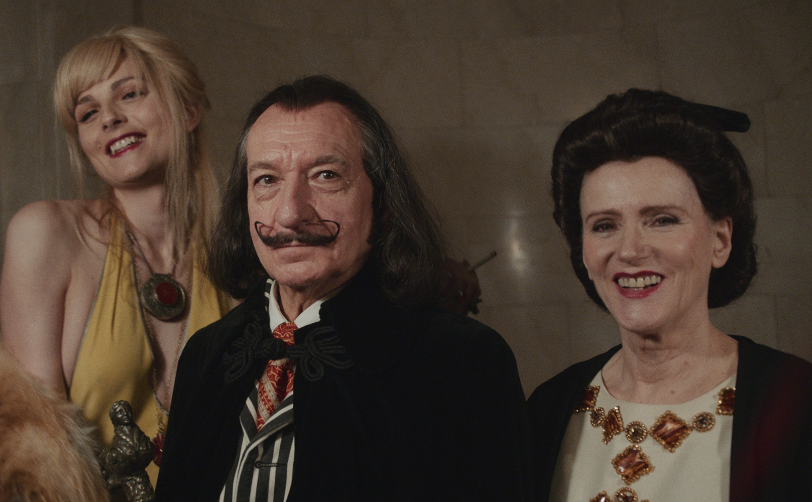Directed by Mary Harron | Written by John Walsh | 97 min | ▲▲△△△ | VOD and Digital Platforms
There’s three things the director of I Shot Andy Warhol, American Psycho, and The Notorious Bettie Page knows about: 1) Weirdos, both the dangerous and harmless variety, 2) Biographical movies, and 3) Art. This should make her an easy choice to do justice to the conflicted, fascinating, and confounding character of Salvador Dali, but somehow she’s bungled it.
Her film is a well-meaning but ill-advised effort to say something about what happens when an artist wakes up one day and finds they’re old and irrelevant. Dali would’ve been offended — not by Ben Kingsley’s take on him as a vain, fallible eccentric, but by how tame the movie is.
It’s 1985, and Dali is preparing for a new show in New York City. The problem is that Dali would rather party with his arty friends and celebrities — Alice Cooper, represent — than paint, and his long-suffering, co-dependent and promiscuous wife, Gala (Barbara Sukowa), needs him to step up for the sake of their finances. His assistant, Captain Moore (Rupert Graves), is also on board, though he might also be pilfering some of the cash that’s coming in.
The filmmakers choose a cliched avenue into Dali’s world: a young, American art-school dropout gets assigned to Dali for the length of his stay in New York. His name is James (Christopher Briney, channeling Michael Pitt at his least charismatic), and he’s got very little in the way of an arc. He’s just there to be wide-eyed, awed and/or disillusioned by all the strangeness on display.
And, unfortunately, there’s not much of that. The film just refuses to shock or to get to the core of why Dali was such a creative iconoclast. We’re talking about events that took place more than 30 years ago, not everyone in the audience is going to remember who he was. Dali’s suite in New York should be a psychedelic bacchanalia, but it just looks like what it is: a set.
James ingratiates himself with Dali, and gets friendly with one of his fellow hangers-on, Ginesta (Suki Waterhouse), eventually following Dali and Gala to Spain, where he learns more about his boss and his relationship with his wife. (Flashbacks featuring the problematic Ezra Miller as the young Dali feel tacked on, and couldn’t they have found at least one hispanic actor for this dual role?)
All of which is disappointing. At its core Daliland is trying to say something about the fear of age, the dominion of vanity, and how celebrity and artistic expression make uncomfortable bedfellows, but even as it reaches for those elements it remains strangely flat.












